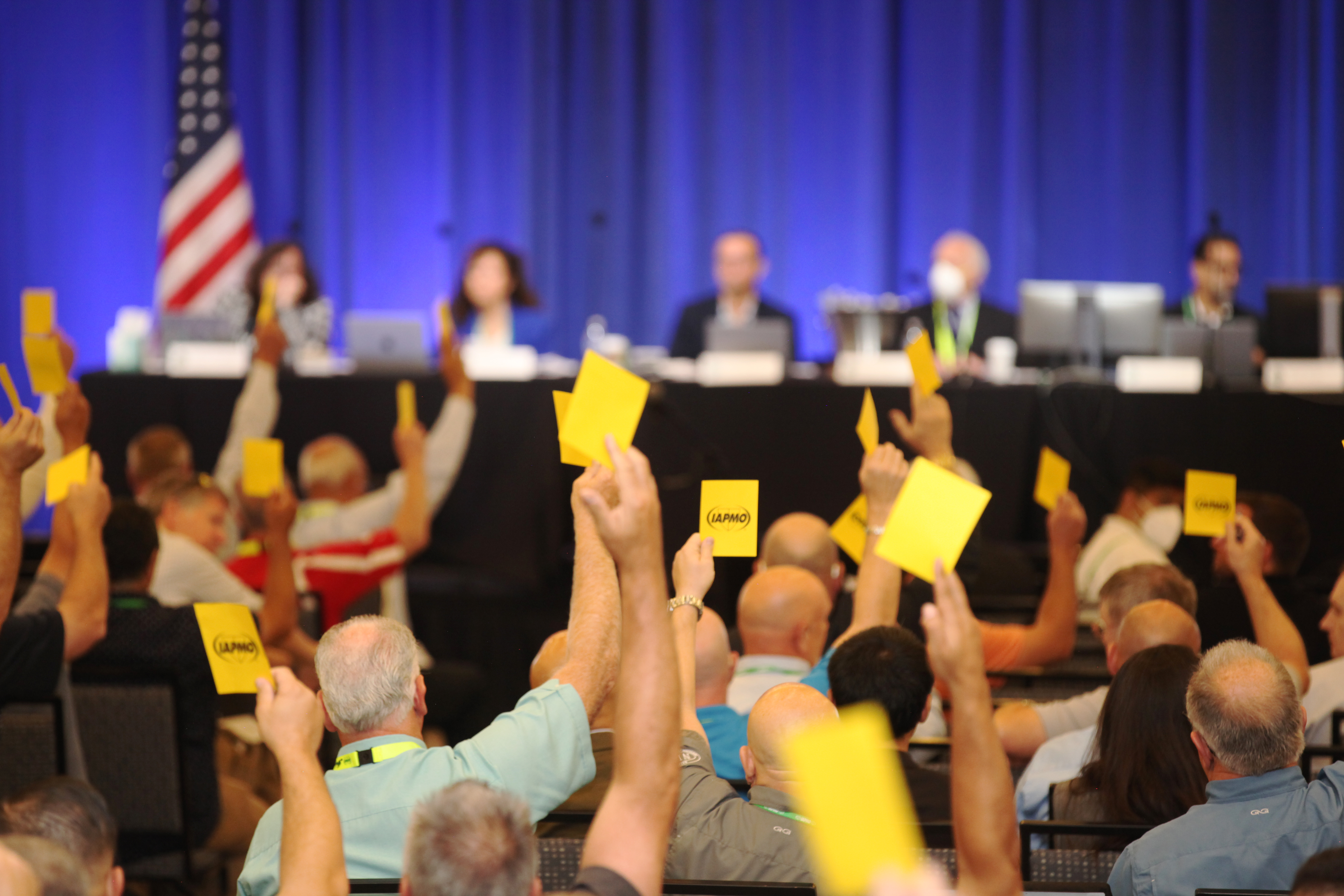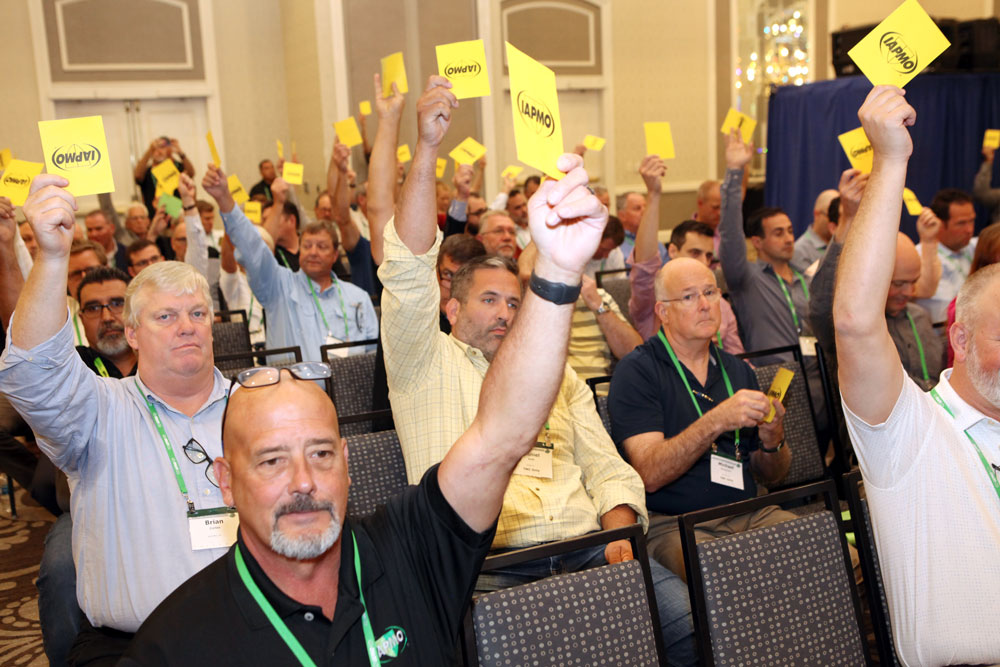
At its January meeting, the IAPMO Board of Directors approved an update to Section 3.5 (Members Entitled to Vote) and Section 8.2 (Motions, Debate and Member Voting Qualifications) of the IAPMO Bylaws. The changes increase the length of membership required for eligibility to vote at IAPMO annual conferences from 180 days to 365 days.
The updated requirement is shown below:
3.5 Members Entitled to Vote.
The term “member(s) present and entitled to vote” as used in this article 3 means a person who is and for at least the preceding one hundred eighty (180) three hundred, sixty-five (365) days was a member entitled to vote, who is physically present at the annual conference or special business meeting at which the vote is taken, and who has paid whatever registration fee has been established by the Board of directors for attendance at such conference or meeting. the limitations upon, and the procedures governing, a person’s status as a member entitled to vote, are set forth in section 8.2.
8.2 Motions, Debate and Member Voting Qualifications.
A. Any member may make or second motions and actively participate in matters under discussion. Not-with standing the aforesaid, the Consensus Code Committee process shall be solely regulated by the Regulations Governing Committee Projects and as otherwise authorized by the IAPMO Standards Council, or the Regulations Governing Consensus Development of the Uniform Solar, Hydronics and Geothermal Code and Uniform Swimming Pool, Spa & Tub Code. The right to vote in the consensus code process, however, is restricted to designated representatives of governmental units who are Voting Members and other persons who have been Voting Members for the period of one hundred eighty (180) three hundred, sixty-five (365) days preceding the day upon which the vote in question is cast and who, with respect to the Annual Conference and/or special business meeting of the general membership, is physically present at such Annual Conference and/or special business meeting and has registered at least one hundred twenty (120) days before the date of the Annual Conference and/or special business meeting or otherwise meets the qualifications of Section 3.5.
The IAPMO bylaws and the Regulations Governing Committee Projects can be at the IAPMO Codes website or clicking here (PDF).
IAPMO Membership
One of the many benefits of the IAPMO consensus code development process is the ability for anyone and everyone to have a voice, and an important group that provides their input to the code development process is IAPMO membership. Eligible members have the opportunity to vote on an Assembly Comment during the Assembly Consideration Session and at the Association Technical Convention held during the association’s annual Education and Business Conference. The changes to the bylaws discussed above ensure that participants are involved in the process throughout the important code development events leading up to these membership votes, as I’ll discuss below. The first opportunity for membership to vote is at the Assembly Consideration session, which occurs during the second year of the three-year development cycle for the Uniform Plumbing Code (UPC®) and Uniform Mechanical Code (UMC®). Eligible IAPMO members in attendance during the UPC and UMC Assembly Consideration Session can vote on an Assembly Comment where successful comments are forwarded to the respective Technical Committee for consideration. Once the motion is made and it is seconded, there is discussion as to why a certain code change is needed or unnecessary, and then the membership votes. Based on the testimony, you get a glimpse into what the industry is thinking on the recent committee action.
The second opportunity to vote is at the Association Technical Meeting Convention, which occurs in the final year of the development cycle. During the annual Education and Business Conference, IAPMO holds the Association Technical Meeting Convention, providing anyone with an opportunity to advocate for their position on proposed changes. The membership’s successful motions are forwarded to the respective Technical Committee, giving committee members one final look at the membership’s recommendation for code language.
This meeting is the last opportunity to advocate your position to membership. Therefore, it is important that you know the procedures, as allowable motions need to meet Section 4-5.7 of the Regulations Governing Committee Projects. To assist, staff is available if needed. You can also contact staff prior to the meeting for assistance on allowed motions. IAPMO urges its members and other interested parties to get involved early on in the code development process to ensure effectiveness in preserving the public health, safety and welfare. Installers, plumbing and mechanical officials, the construction industry, engineers, industry experts, and manufacturers all benefit from a cooperative effort in developing codes.
IAPMO’s Consensus Development Process
IAPMO employs a consensus development process accredited by the American National Standards Institute (ANSI), gathering the largest assembly of plumbing and mechanical experts in the world at its annual Education and Business Conference and Technical Committee meetings, enabling anyone — members and non-members alike — to propose changes to the code.

If you want to participate in the code development process, it is important that you are involved from the start of the cycle; your participation from the beginning will provide you with the most opportunities for your voice to be heard. In each code cycle, IAPMO provides many opportunities to voice your opinion and to share information with the technical committees:
- Proposal Hearing: IAPMO publishes proposals for changes to the UMC and UPC in the Proposal Monograph, not less than a month before the proposal hearing. This “agenda” enables the public to review what will be discussed by the committee and voice their opinion during the Technical Committee hearing.
- After the Proposal Hearing: IAPMO publishes the Report on Proposals (ROP), enabling the public to view the committee actions and ballot results on proposals. This information allows participants to voice their opinion during the Assembly Consideration Session.
- Assembly Consideration Session: Anyone may voice their opinion to membership, and membership will vote on motions made by the public. Successful motions are forwarded to the Technical Committee as an Assembly Comment for their consideration.
- Comments Hearing: Public comments received are published, in the Comments Monograph, not less than a month before the comments hearing, again enabling the public to review this “agenda” and voice their opinion during the Technical Committee hearing.
- After the Comments Hearing: IAPMO publishes the Report on Comments (ROC), enabling the public to view the committee actions and ballot results on comments. This information allows participants to voice their opinion during the Annual Education and Business Conference.
- Annual Education and Business Conference / Association Technical Meeting Convention: Upon an appropriate motion, anyone may share their view on the motion. Successful motions are forwarded to the Technical Committee for their consideration.
The importance of being involved in the code development process throughout the cycle cannot be emphasized enough. It’s not a requirement that one be involved every step of the way, but it certainly helps one’s understanding when they’ve followed a proposal from early in the process.
The timelines for the development of the 2027 UPC and UMC have been posted online. The “IAPMO Codes” mobile app can also be downloaded to your iOS or Android devices, allowing users to obtain direct contact information for questions, view the 2027 development timeline and to receive automatic notifications on important dates or when crucial documents become available. We look forward to seeing you next year as we get development of the 2027 UPC and UMC underway.

Hugo Aguilar, P.E.
Last modified: May 8, 2024
